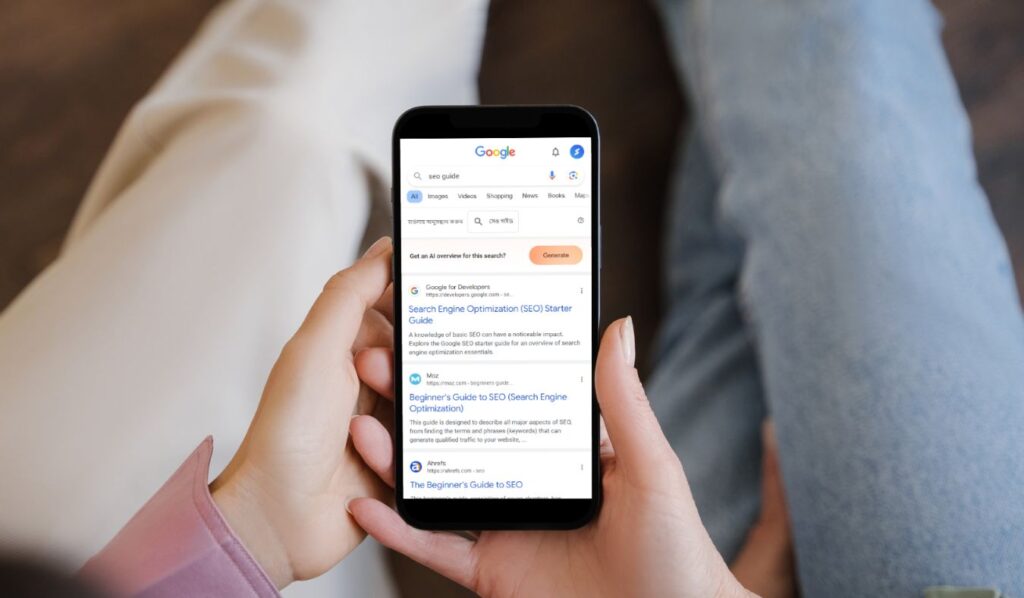The Importance of Keywords
Think of keywords as the secret language between your website and your ideal customers. They’re the terms people type into search engines when they’re looking for solutions to problems that your business solves. Mastering keyword research is the key to making sure your content gets seen by the right people at the right time.
It’s Not Just About Search Volume: While finding keywords that get a lot of searches is important, it’s not the whole story. To truly drive results from your content, we need to dig deeper. Here’s why:
- Understanding Intent: Are people searching to buy something, to learn, or trying to find a specific place? Matching your content to their intent is crucial.
- Aligning with Your Goals: A blog post with high traffic is useless if it doesn’t attract people likely to become paying customers or loyal fans.
This Guide’s Purpose
Our goal isn’t to just throw a bunch of keyword tools at you. We want to help you develop a strategic understanding of keywords and give you the practical steps to find the ones that have the most potential to grow your business.
Ready to unlock the power of keywords? Let’s dive in!
1. Understanding Search Intent
Keywords are powerful, but they’re not magic. To get the right people to your content, you need to understand the why behind their search.
Beyond the Words
Let’s break it down:
- Informational Search: User wants to learn – “how to fix a leaky faucet,” “best time to visit Greece,” “what is SEO?”
- Transactional Search: User is ready to buy – “iPhone 14 Pro Max best price,” “vegan restaurants near me,” “hire a freelance copywriter”
- Navigational Search: User wants a specific website – “Nike official store,” “Harvard University admissions,” “[Brand Name] login”
Types of Intent
Examples for Different Businesses
- Local Plumber: “emergency plumber [city name]”, “clogged drain fix” (informational, but hints at potential need for service)
- Ecommerce Store Selling Jewelry: “unique bridal jewelry,” “sterling silver heart necklace” (transactional)
- Freelance Blogger: “content writing rates,” “how to start a travel blog” (mix of informational and potential clients researching before hiring)
Why Intent Matters
Picture this: your article on “10 Fun Fall Date Ideas” ranks #1. Great traffic, but if searchers were mainly looking to BUY something fall-themed, they’ll click away fast. Here’s the bottom line:
- Traffic Without Conversions is Useless: Focus on keywords that align with the goal of each piece of content.
- Intent Can Evolve: Keep an eye on customer journey – someone starts with research (informational), then may progress to purchase intent (transactional) later.
2. Tools of the Trade
Finding those golden keywords requires the right tools. Let’s explore your options, from readily available freebies to powerful paid platforms.
Free is a Good Start
- Google Trends: See how searches for terms change over time (seasonal peaks, etc.). Great for spotting emerging trends.
- Google Keyword Planner: Designed for AdWords, but useful insights. Requires a free Ads account, but you don’t have to run campaigns.
- AnswerThePublic: Visualizes questions people ask around a topic. Helps uncover long-tail opportunities.
- Also Consider: “Autocomplete” in search bars, “People Also Ask” boxes in results, even related searches at the bottom of a results page.
Paid for Power
As your business grows, these tools offer more advanced features:
- Ahrefs, SEMrush, etc.: Keyword difficulty, in-depth competitor analysis, track your own rankings… worth it if SEO is a major part of your marketing.
- Niche-Specific Tools: Some industries have their own specialized platforms, especially for local SEO.
Don’t Forget: Your “Secret Weapons”
- Website Analytics: What are people ALREADY searching to find your site? Hidden gems here!
- Customer Surveys: Ask directly what problems they had BEFORE finding your solution. Turn those into keywords.
- Sales Team Insights: What questions do potential customers frequently ask during the sales process?
Important Note: Even free tools are useless without the strategic thinking behind your keyword choices. The real value is in the analysis, not the price of the tool.
3: Finding Your Seed Keywords
Let’s start by identifying the core concepts that define your business and what your audience is searching for.
Start with the Basics
Don’t overthink this! Begin with broad terms related to your niche. Here’s an example for a bakery:
- Obvious: cake, cupcakes, cookies, pastries
- Specific Products: wedding cake, birthday cake, gluten-free desserts, custom cake designs
- Location (If Relevant): [city name] bakery, best bakery near me
Customer’s Language
Think like your ideal customer, not like an industry insider. Here’s how to rephrase things:
- Problem-Focused: Instead of “vegan desserts,” consider “delicious desserts for dairy allergies.”
- Natural, Not Jargon: “Birthday cake delivery” is more likely to be searched than “custom confectionery creations.”
- Benefits Over Features: “Stress-free wedding catering” hits a pain point better than simply listing your menu options.
Competitor Analysis:
- What’s Working for Them?: Tools like SEMrush let you see the keywords your successful competitors are ranking for (don’t blindly copy them, but get inspiration).
- Find The Gaps: Are there niche topics (flavors, special occasions, dietary needs) your competitors are neglecting? This is untapped opportunity!
- Ethical Approach: Use competitor data to spark ideas, but always put your own unique spin on the content you create.
Important: Keep a running list of ALL potential keywords at this stage – we’ll worry about narrowing them down later!
4. Expanding Your Keyword Universe
We’ve got your seed keywords, now let’s grow them into a thriving keyword garden! Here’s how to find those less obvious opportunities:
Long-Tail Power
Long-tail keywords are where the magic happens. These are more specific, often longer phrases with lower search volume, BUT…
- Easier to Rank: “Gluten-free cupcakes NYC” is less competitive than just “cupcakes.”
- High Intent: Someone searching that specifically is more likely to be ready to buy, not just browse.
- Ideas Galore: Start with your seed keywords and add: locations, modifiers (“best,” “affordable”), audience (“for men,” “for kids”).
LSI (Latent Semantic Indexing)
These are the related terms Google understands are connected to your main topic. They help your content signal relevance.
- Tools Help: SEMrush, etc. have LSI features. Free option: Google the term and see those related searches at the bottom!
- Use Naturally: Sprinkle them into your content where it makes sense, but avoid keyword stuffing.
“People Also Ask” Goldmine
These questions in search results show you exactly what searchers want to know. Perfect for:
- FAQ Pages: Optimize an existing page, or create one if you lack a place to address questions.
- Blog Ideas: Can you write a comprehensive post that answers the question BETTER than the current results?
- Understanding Intent: Are people mainly DIY-ing it, or looking to hire help? Align your content with their needs.
Pro Tip: As your site grows in authority, you can start ranking for more competitive keywords too, but long-tails form the strong foundation.
5. Checklist for Choosing Profitable Keywords
You’ve got a solid list of keyword contenders. Now, let’s separate the winners from the duds. Ask yourself these critical questions about each keyword:
- Search Volume: Is the Demand There? Tools give you a number, but sometimes common sense is needed too. Does it feel like something people would actually search for?
- Relevance: Is it a Perfect Match? Great traffic is useless if it’s for a product/service you don’t even offer. Be ruthless in prioritizing specificity.
- Difficulty: Realistic Goals As a new site, going after super competitive terms is an uphill battle. Balance a few ambitious goals with easier wins using long-tails.
- Commercial Intent: Buy or Browse? “Wedding cake ideas” is great for blog traffic, but “custom wedding cake [location]” screams buyer ready to place an order.
Additional Considerations
- Your Business Goals: Are you focused on lead generation, brand awareness, e-commerce sales? This impacts keyword choices.
- Content Type: “Best X for Y” style listicles attract different intent than “How to X” tutorials.
- Seasonality: Some keywords spike at certain times of year (think “Halloween costumes”). Plan content accordingly!
Important: Keyword research is iterative. Revisit your choices as your website grows, and as search trends change!
Getting Started
Ready to get laser-focused on the RIGHT keywords for your business?
Keyword research can be tricky, especially in competitive industries. Brand Sewa offer Free SEO Consultation consultations to help you uncover those hidden opportunity keywords and develop a comprehensive SEO plan
Let’s work together to achieve those first-page rankings and attract your dream customers through the power of search!




